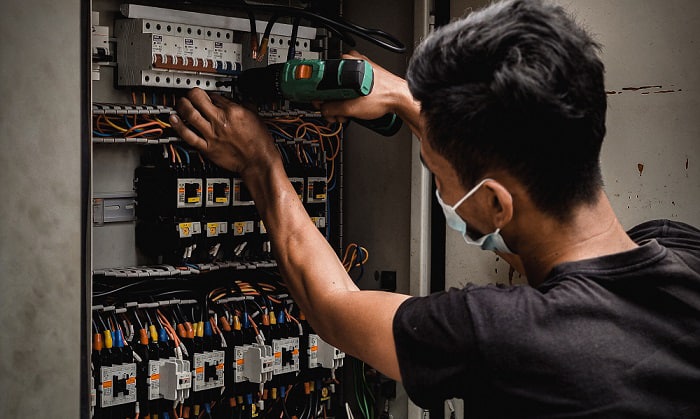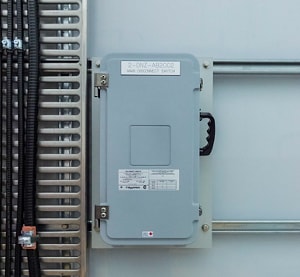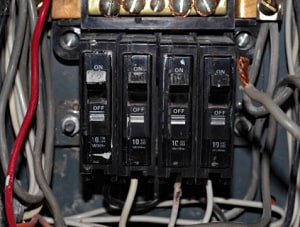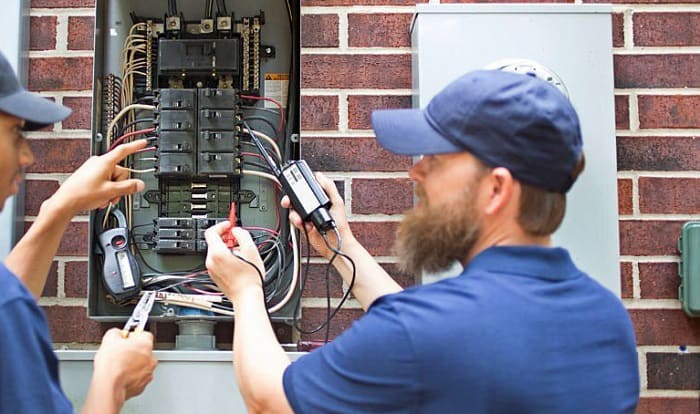Different electrical circuits have varying electrical demands. As a result, various tools should be used for the safety of each circuit.
The circuit breaker and the disconnect switch are some of them. These devices help prevent electrical damage caused by fire and electrocution that can stem from electrical faults.
In this article, we will discuss the circuit breaker vs disconnect switch differences to help you understand where and when these instruments are used in a circuit.
Table of Contents
Disconnect Switch Vs Circuit Breaker
What is Disconnect Electrical Switch?
As its name implies, a disconnect or electrical shut off switch disconnects electrical power. This means that it interrupts the current flow in the circuit where it is installed.
This device is mainly operated manually and utilized only on one part of a circuit where power must be removed or restored.
Generally, two electrical disconnect boxes are used in most home and commercial electrical systems. These are the non-fused and fused disconnect switches.
- Fused disconnect vs non fused ones are not that different from each other. They both make it simple to open and close a circuit.
- However, fusible disconnect switches give greater safety than non-fused disconnect switches. They offer overcurrent protection features, such as guarding against short circuits and overloads, thanks to the usage of a fuse.
- A fused circuit breaker or, more accurately, a fused switch is required in setups with larger loads. If it becomes damaged, you must replace the fuse to be able to use the disconnect again.
On the other hand, a non-fused disconnect is typically found in low-power equipment and has no overcurrent protection. Therefore, calling it a disconnect breaker or fuse would be inaccurate.
What is Circuit Breaker?
A circuit breaker is a device that protects against short circuits and overloads. It has a switch feature that can be used manually to turn the circuit that needs repair on and off.
In addition, circuit breaker disconnect features can automatically activate in the event of an electrical fault. The electromagnetic components inside sense the overcurrent before it damages the device or results in a fire.
Typically, there are two breaker switch types used in a residential house: single-pole and double-pole, though there are other ways of categorizing these devices.
Differences between Non-fused and Fused Disconnect vs Circuit Breaker
Now that you have some basic knowledge regarding the disconnect switch and circuit breaker, let’s see their differences or pros and cons.
- A circuit breaker can remove the electrical connection of the entire circuit, while a switch disconnect only removes power from one part of it.
- A circuit breaker switch is highly reusable. One only needs to repair the electrical problem and reset the device, unlike a disconnect switch, which requires changing a fuse to enable reuse.
- A disconnect switch’s purpose is to disconnect the electrical connection of a circuit manually. On the other hand, the breaker can monitor the power flow of a circuit and disconnect the current in the event of a fault.
- A disconnect is generally less expensive than the price of a breaker. However, in terms of a replacement, repeatedly changing the fuse after damage can cost you more than utilizing a breaker.
- Though a circuit breaker can be reset, it cannot be used as a switch like a disconnect.
- The fuse in the disconnect reacts more quickly than a circuit breaker in the event of an overcurrent.
FAQs
Is a Disconnect Switch Considered a Circuit Breaker?
A fusible disconnect can be considered an overcurrent protection device, as it can cut off the electrical flow of a circuit. Sometimes, it can also be used in place of a breaker.
However, it cannot be considered a circuit breaker due to the abovementioned differences.
Is a Main Breaker the Same as a Disconnect?
Yes, the main breaker can be the main disconnect switch of circuits and sub-panels. In terms of safety, it is used to disconnect the power of the entire electrical system during an emergency or to install new circuits.
When Should You Use a Disconnect Switch?
Industrial equipment and motors usually have high loads of electricity, which is when fused disconnects are the most important part of the required protection setup. They can be used to prevent accidents during operation or repair.
Furthermore, a disconnect switch is a safety requirement mandated by the NEC in all manufacturing businesses.
When are fused disconnects required?
When installing HVAC equipment, if the manufacturer requires fuses to be installed, then you must include them. This inclusion may be in the form of a fused disconnect.
Conclusion
The typical household lightings are an example of what applications require both breaker and disconnect. However, a disconnect switch is not always required in every circuit, while a circuit breaker generally is.
Knowing the difference between circuit breaker vs disconnect switch will give you an idea of where to use these tools. If you still have difficulties understanding these devices, you can ask a professional about them.
Related:

I am Edwin Jones, in charge of designing content for Galvinpower. I aspire to use my experiences in marketing to create reliable and necessary information to help our readers. It has been fun to work with Andrew and apply his incredible knowledge to our content.




